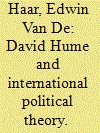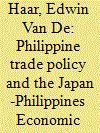| Srl | Item |
| 1 |
ID:
086143


|
|
|
|
|
| Publication |
2008.
|
| Summary/Abstract |
David Hume's ideas on international relations are different than most international relations academics suppose. Close scrutiny of Hume's views on the nation, international society, war, balance of power, empire and trade reveals the need to reassess his place within international political theory. Taking an English School perspective, the analysis also shows the possible benefits for IR theorists within this tradition to focus on Scottish Enlightenment philosophy, which will also strengthen the position of the pluralist perspective within international society.
|
|
|
|
|
|
|
|
|
|
|
|
|
|
|
|
| 2 |
ID:
104132


|
|
|
|
|
| Publication |
2011.
|
| Summary/Abstract |
Taking the problematic ratification of the Japan-Philippines Economic Partnership Agreement (JPEPA) as a focal point, this article aims to determine the current state and future prospects of Philippine trade policy. Utilizing a multi-level approach, the motives and actions of the Philippines are analysed within the broader historical and socio-political framework of the country's trade policy. JPEPA was initiated by Tokyo and for both Japan and the Philippines it served important foreign policy goals, although the economic benefits for the latter were also substantial. The analysis shows that political institutions in the Philippines do not exert much influence on trade policy outcomes, the major exception being the office of the President. Domestic interests are far more important for Philippine trade policy. The analysis indicates that trade liberalization has hardly ever been an issue in Philippine politics, except in rare cases when it came to be foregrounded by a combination of incidental domestic political processes and initiatives of foreign powers such as Japan or regional organizations like ASEAN and APEC. The JPEPA case has reinforced the existing domestic trade policy gridlock, although external initiatives by foreign countries and regional organizations will remain of key importance for further trade liberalization in the Philippines.
|
|
|
|
|
|
|
|
|
|
|
|
|
|
|
|